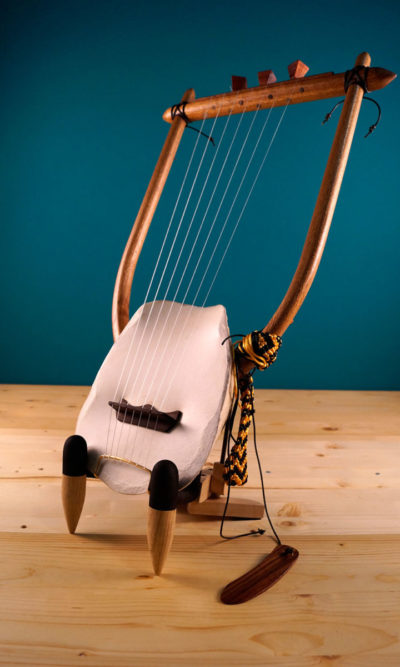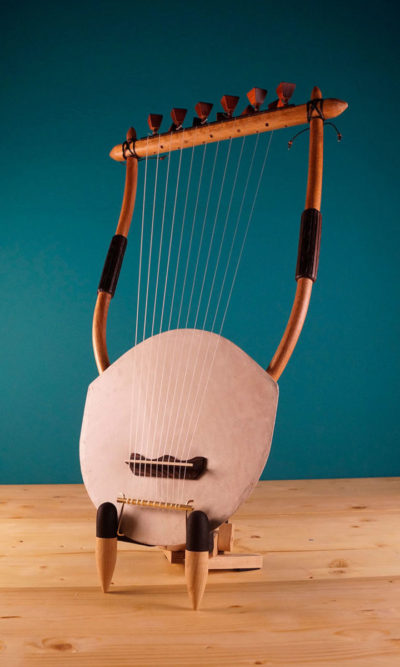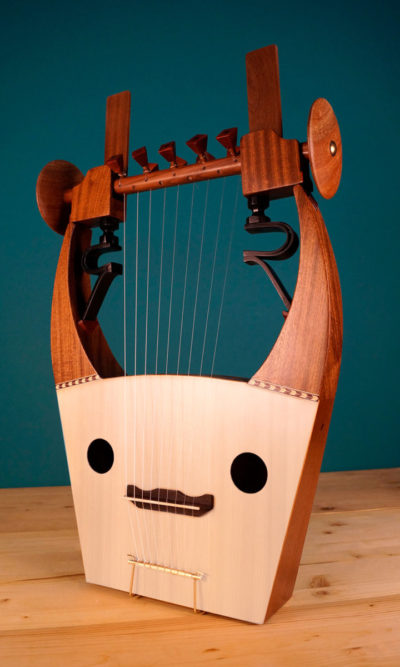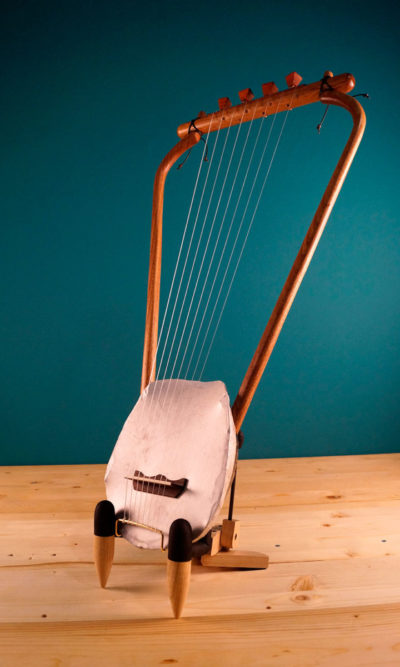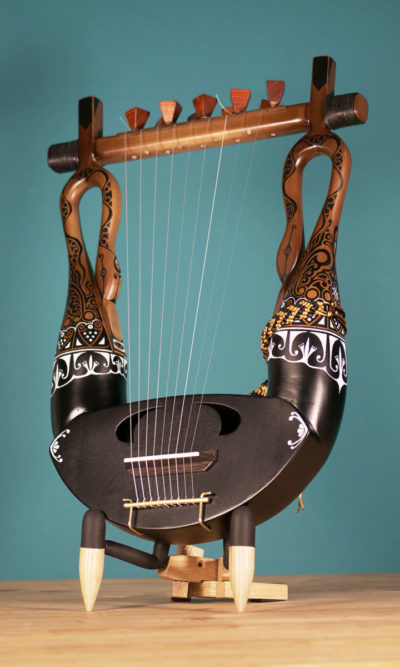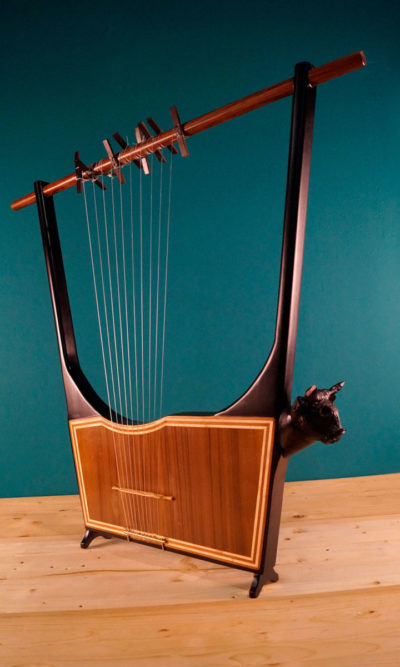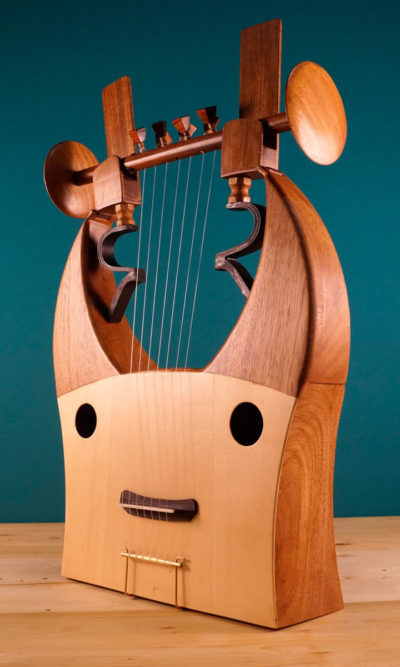 |
| Calliope, Muse of Poetry, Song and Dance |
"Do not presume her to be a goddess
if you are not offering loyalty at her altar."
- a poet's sentiment of Calliope
KALLIOPE or KALLIOPEIA (transliterated) (Καλλιοπη Καλλιοπεια, Greek; Calliope, Latin) was the eldest of the Mousai (Muses), the goddesses of music, song and dance. She was also the goddess of eloquence, who bestowed her gift on kings and princes. In the Classical era, when the Muses were assigned specific artistic spheres, Kalliope was named Muse of epic poetry. In this guise she was portrayed holding a tablet and stylus or a scroll. In older art she holds a lyre.
Kalliope was the mother of the bard Orpheus. When her son was dismembered by the Bakkhantes (Bacchantes), she recovered his head and enshrined on the island of Lesbos.
Her name means "beautiful-voiced" from the Greek words kallos and ops.
 |
| Muse Calliope and Apollo, Athenian red-figure kylix C5th B.C., Victoria and Albert Museum |
CALLIOPE GODDESS OF EPIC POETRY & ELOQUENCE
Hesiod, Theogony 75 ff (trans. Evelyn-White) (Greek epic C8th or C7th B.C.) :
"Kalliope (Calliope), who is the chiefest of them all [the Mousai (Muses)], for she attends on worshipful princes: whomsoever of heaven-nourished princes the daughters of great Zeus honour, and behold him at his birth, they pour sweet dew upon his tongue, and from his lips flow gracious words. All the people look towards him while he settles causes with true judgements: and he, speaking surely, would soon make wise end even of a great quarrel; for therefore are there princes wise in heart, because when the people are being misguided in their assembly, they set right the matter again with ease, persuading them with gentle words. And when he passes through a gathering, they greet him as a god with gentle reverence, and he is conspicuous amongst the assembled: such is the holy gift of the Mousai (Muses) to men."
Alcman, Fragment (trans. Campbell, Vol. Greek Lyric II) (Greek lyric C7th B.C.) :
"Come Moisa (Muse), Kalliope (Calliope), daughter of Zeus, begin the lovely verses; set desire on the song and make the choral dance graceful."
Stesichorus, Fragment 240 (trans. Campbell, Vol. Greek Lyric III) (C7th to 6th B.C.) :
"Come hither, clear-voiced Kallopeia (Calliope)."
Stesichorus, Fragment 275 :
"Excellent Kalliope (Calliope), admired for your poetry and songs."
Bacchylides, Fragment 5 (trans. Campbell, Vol. Greek Lyric IV) (Greek lyric C5th B.C.) :
"White-armed Kalliope (Calliope), halt your well-made chariot here: sing in praise of . . ."
Bacchylides, Fragment 19 :
"Countless paths of ambrosial verses lie open for him who obtains gifts from the Pierian Mousai (Muses) and whose songs are clothed with honour by the violet-eyed maidens, the garland-bearing Kharites (Charites, Graces). Weave, then, in lovely blessed Athens a new fabric, renowned Kean (Cean) fantasy: you must travel by the finest road, since you have obtained from Kalliope (Calliope) a surpulative prize."
Plato, Phaedrus 259 (trans. Fowler) (Greek philosopher C4th B.C.) :
"When they [the grasshoppers] die they go and inform the Mousai (Muses) in heaven who honours them on earth. They win the love of Terpsikhore (Terpsichore) for the dancers by their report of them; . . . of Kalliope (Calliope) the eldest Mousa (Muse) and of Ourania (Urania) who is next to her, for the philosophers, of whose music the grasshoppers make report to them; for these are the Mousai who are chiefly concerned with heaven and thought, divine as well as human, and they have the sweetest utterance."
Diodorus Siculus, Library of History 4. 7. 1 (trans. Oldfather) (Greek historian C1st B.C.) :
"Hesiod even gives their [the Mousai's (Muses')] names when he writes: ‘Kleio (Clio), Euterpe, and Thaleia, Melpomene, Terpsikhore (Terpsichore) and Erato, and Polymnia, Ourania (Urania), Kalliope (Calliope) too, of them all the most comely.’
To each of the Mousai (Muses) men assign her special aptitude for one of the branches of the liberal arts, such as poetry, song, pantomimic dancing, the round dance with music, the study of the stars, and the other liberal arts . . . For the name of each Mousa (Muse), they say, men have found a reason appropriate to her . . . Kalliope (Calliope), because of her beautiful (kale) voice (ops), that is, by reason of the exceeding beauty of her language she wins the approbation of her auditors."
Philostratus the Younger, Imagines 13 (trans. Fairbanks) (Greek rhetorician C3rd A.D.) :
"The gifts of the gods are not to be rejected, as you no doubt know, since you have heard it from one of the devotees of Kalliope (Calliope) [i.e. the epic poets]."
Ovid, Fasti 5. 79 ff (trans.Boyle) (Roman poetry C1st B.C. to C1st A.D.) :
"Then with ivy twining her neglected hair, Calliope began [the song], first of her group . . . She, too, had ended; her faction roared their support. What to do? All the parties are equal. May the Pierides [Muses] smile on me equally, and I extol none of them more or less."
Propertius, Elegies 3. 3 (trans. Goold) (Roman elegy C1st B.C.) :
"The nine Maidens [Muses], each allotted her own realm, busy their tender hands on their separate gifts . . . Then from their number one of the goddesses laid her hand on me (by her looks I think it was Calliope) : ‘You will always be happy to ride on snow-white swans; no galloping hooves of the war-horse will call you to arms. Be it no concern of yours to sound the martial summons on the blaring trumpet or stain with bloody warfare the groves of Helicon . . . For you will sing of garlanded lovers at another's threshold and the tipsy tokens of midnight vigil, so that he who would artfully outwit stern husbands may learns from you how to charm forth a locked-up woman.’Thus Calliope, and taking water from the spring she moistened my lips with draughts [from the spring of Hippokrene (Hippocrene) on Mount Helikon] that once Philitas drank."
Propertius, Elegies 3. 2 :
"The Musae (Muses) are my friends, my poems are dear to the reader, and Calliope never wearies of dancing to my rhythms."
Propertius, Elegies 4. 6 :
"I shall tell, O Musa (Muse), of Apollo's temple on the Palatine : Calliope, the theme is worthy of your favour. My songs are sung for Caesar's glory: while Caesar is being sung, do even you pray attend, Jupiter [Zeus]!"
Statius, Thebaid 4. 32 ff (trans. Mozley) (Roman epic C1st A.D.) :
"Thou, Calliope, queen of the groves of song, uplift thy lyre and begin the tale."
Statius, Silvae 2. 7. 36 (trans. Mozley) (Roman poetry C1st A.D.) :
"Straightway, while yet a new-born babe he [the poet] drawled and with earliest accents sweetly whimpered, Calliope took him to her loving bosom. Then first did she lay aside her grief and cease her long lament for Orpheus, and said: ‘O boy, consecrate to poesy, soon destined to outmatch the bards of old, thou shalt move no rivers or wild herds of Thracian ash-trees with thy music, but with eloquent son shalt draw after thee the seven hills of Martian Tiber [Rome].’"
* * * * * * * *
Recent Poems dedicated to Calliope
* * * * * * * *
Ancient Lyre & Vocals - "Journey"
by Aphrodite Patoulidou and Theodore Koumartzis (Improvisation)
Premiered Nov 4, 2020
Calliope: The Muse of Eloquence and Epic Poetry
- Mythology Dictionary - See u in History
Jul 29, 2019
Calliope, a Greek Muse
Calliope, also spelled Kalliope, in Greek mythology, according to Hesiod’s Theogony, foremost of the nine Muses; she was later called the patron of epic poetry. At the behest of Zeus, the king of the gods, she judged the dispute between the goddesses Aphrodite and Persephone over Adonis. In most accounts she and King Oeagrus of Thrace were the parents of Orpheus, the lyre-playing hero. She was also loved by the god Apollo, by whom she had two sons, Hymen and Ialemus. Other versions present her as the mother of Rhesus, king of Thrace and a victim of the Trojan War; or as the mother of Linus the musician, inventor of melody and rhythm. Her image appears on the François Vase, made by the potter Ergotimos about 570 BCE.
- Calliope: Muse of heroic or epic poetry (often holding a writing tablet)
- Clio: Muse of history (often holding a scroll)
- Erato: Muse of lyric and love poetry (often playing a lyre)
- Euterpe: Muse of music or flutes (often playing flutes)
- Melpomene: Muse of tragedy (often holding a tragic mask)
- Polymnia: Muse of sacred poetry or of the mimic art (often shown with a pensive look)
- Terpsichore: Muse of dancing and choral song (often shown dancing and holding a lyre)
- Thalia: Muse of comedy (often holding a comic mask)
- Urania: Muse of astronomy [planet, Uranus] (often holding a globe)
The Muses - Greek Mythology
Dec 3, 2017
Muses: The 9 Inspirational Goddesses of Greek Mythology
Mythology Dictionary - See U in History
Nov 30, 2018
* * * * * * * *
Muse of Greek mythology
Muse, Greek Mousa or Moisa, Latin Musa, in Greco-Roman religion and mythology, any of a group of sister goddesses of obscure but ancient origin, the chief centre of whose cult was Mount Helicon in Boeotia, Greece. They were born in Pieria, at the foot of Mount Olympus. Very little is known of their cult, but they had a festival every four years at Thespiae, near Helicon, and a contest (Museia), presumably—or at least at first—in singing and playing. They probably were originally the patron goddesses of poets (who in early times were also musicians, providing their own accompaniments), although later their range was extended to include all liberal arts and sciences—hence, their connection with such institutions as the Museum (Mouseion, seat of the Muses) at Alexandria, Egypt. There were nine Muses as early as Homer’s Odyssey, and Homer invokes either a Muse or the Muses collectively from time to time. Probably, to begin with, the Muses were one of those vague collections of deities, undifferentiated within the group, which are characteristic of certain, probably early, strata of Greek religion.
Differentiation is a matter rather of mythological systematization than of cult and began with the 8th-century-BCE poet Hesiod, who mentioned the names of Clio, Euterpe, Thalia, Melpomene, Terpsichore, Erato, Polymnia (Polyhymnia), Urania, and Calliope, who was their chief. Their father was Zeus, and their mother was Mnemosyne (“Memory”). Although Hesiod’s list became canonical in later times, it was not the only one; at both Delphi and Sicyon there were but three Muses, one of whom in the latter place bore the fanciful name Polymatheia (“Much Learning”). All the Hesiodic names are significant; thus Clio is approximately the “Proclaimer,” Euterpe the “Well Pleasing,” Thalia the “Blooming,” or “Luxuriant,” Melpomene the “Songstress,” Erato the “Lovely,” Polymnia “She of the Many Hymns,” Urania the “Heavenly,” and Calliope “She of the Beautiful Voice.” Because dancing was a regular accompaniment of song, it is not remarkable that Hesiod called one of his nine “Delighting in the Dance,” Terpsichore.
The Muses are often spoken of as unmarried, but they are repeatedly referred to as the mothers of famous sons, such as Orpheus, Rhesus, Eumolpus, and others connected somehow either with poetry and song or with Thrace and its neighbourhood, or both. In other words, all their myths are secondary, attached for one reason or another to the original vague and nameless group. Hence there is no consistency in these minor tales—Terpsichore, for example, is named as the mother of several different men by various authors and Orpheus generally is called the son of Calliope but occasionally of Polymnia.
Statues of the Muses were a popular decoration in long galleries and similar places; naturally, sculptors did not make them all alike but gave each a different attribute, such as a lyre or scroll. This may have contributed to the fanciful distribution of individual Muses among the different arts and sciences, especially in Roman times. The lists that have come down are all late and disagree with one another. A common but by no means definitive list is the following:
* * * * * * * *
also reference
The World of Mythology - Calliope
* * * * * * * *
Thanasis Kleopas - Hymn to muse Kalliope and Apollo
ύμνος στη μούσα Καλλιόπη και τον Απόλλωνα
Aug 22, 2017
* * * * * * * *
The World of the Lutheiros
The essence of a LUTHIEROS instrument is that its sound quality
is getting better and better over the years.
musical artifacts of the ancient world
Ancient Greek Lyre, Rui Fu, and Bendir
May 16, 2018
Ancient World Music is a genre that expands swiftly with new musicians from all over the globe, and SEIKILO Channel is committed to supporting and introducing them to the world!For more videos like this, subscribe to our channel:
* * * * * * * *
Variants of the Usage of Calliope
Wikipedia - Calliope (music) - Wikipedia
A calliope (see below for pronunciation) is a musical instrument that produces sound by sending a gas, originally steam or, more recently, compressed air, through large whistles—originally locomotive whistles.A calliope is typically very loud. Even some small calliopes are audible for miles. There is no way to vary tone or loudness. Musically, the only expression possible is the pitch, rhythm, and duration of the notes.The steam calliope is also known as a steam organ or steam piano. The air-driven calliope is sometimes called a calliaphone, the name given to it by Norman Baker, but the "Calliaphone" name is registered by the Miner Company for instruments produced under the Tangley name.In the age of steam, the steam calliope was particularly used on riverboats and in circuses. In both cases, a steam supply was readily available for other purposes. Riverboats supplied steam from their propulsion boilers. Circus calliopes were sometimes installed in steam-drive carousels, or supplied with steam from a traction engine. The traction engine could also supply electric power for lighting, and tow the calliope in the circus parade, where it traditionally came last. Other circus calliopes were self-contained, mounted on a carved, painted and gilded wagon pulled by horses, but the presence of other steam boilers in the circus meant that fuel and expertise to run the boiler were readily available. Steam instruments often had keyboards made from brass. This was in part to resist the heat and moisture of the steam, but also for the golden shine of the highly polished keys.Calliopes can be played by a player at a keyboard or mechanically. Mechanical operation may be by a drum similar to a music box drum, or by a roll similar to that of a player piano. Some instruments have both a keyboard and a mechanism for automated operation, others only one or the other. Some calliopes can also be played via a MIDI interface.The whistles of a calliope are tuned to a chromatic scale, although this process is difficult and must be repeated often to maintain quality sound. Since the pitch of each note is largely affected by the temperature of the steam, accurate tuning is nearly impossible; however, the off-pitch notes (particularly in the upper register) have become something of a trademark of the steam calliope. A calliope may have anywhere from 25 to 67 whistles, but 32 is traditional for a steam calliope.
Delta Queen Colliope Music
Jan 2007





